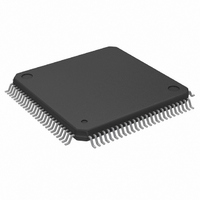MC68EC020AA25 Freescale Semiconductor, MC68EC020AA25 Datasheet - Page 168

MC68EC020AA25
Manufacturer Part Number
MC68EC020AA25
Description
IC MPU 32BIT 25MHZ 100-QFP
Manufacturer
Freescale Semiconductor
Datasheet
1.MC68EC020AA16.pdf
(306 pages)
Specifications of MC68EC020AA25
Processor Type
M680x0 32-Bit
Speed
25MHz
Voltage
5V
Mounting Type
Surface Mount
Package / Case
100-QFP
Family Name
M68000
Device Core
ColdFire
Device Core Size
32b
Frequency (max)
25MHz
Instruction Set Architecture
RISC
Supply Voltage 1 (typ)
5V
Operating Supply Voltage (max)
5.25V
Operating Supply Voltage (min)
4.75V
Operating Temp Range
0C to 70C
Operating Temperature Classification
Commercial
Mounting
Surface Mount
Pin Count
100
Package Type
PQFP
Lead Free Status / RoHS Status
Lead free / RoHS Compliant
Features
-
Lead Free Status / Rohs Status
RoHS Compliant part
Electrostatic Device
Available stocks
Company
Part Number
Manufacturer
Quantity
Price
Company:
Part Number:
MC68EC020AA25
Manufacturer:
Freescale Semiconductor
Quantity:
10 000
Company:
Part Number:
MC68EC020AA25R
Manufacturer:
Freescale Semiconductor
Quantity:
10 000
- Current page: 168 of 306
- Download datasheet (2Mb)
The final portion of the cpScc instruction format contains zero to five effective address
extension words. These words contain any additional information required to calculate the
effective address specified by bits 5–0 of the F-line operation word.
7.2.2.2.2 Protocol. Figure 7-8 shows the protocol for the cpScc instruction. The
MC68020/EC020 transfers the condition selector to the coprocessor by writing the word
following the F-line operation word to the condition CIR. The main processor then reads
the response CIR to determine its next action. The coprocessor can return a response
primitive to request services necessary to evaluate the condition. The operation of the
cpScc instruction depends on the condition evaluation indicator returned to the main
processor by the coprocessor. When the coprocessor returns the false condition indicator,
the main processor evaluates the effective address specified by bits 5–0 of the F-line
operation word and sets the byte at that effective address to FALSE (all bits cleared).
When the coprocessor returns the true condition indicator, the main processor sets the
byte at the effective address to TRUE (all bits set to one).
7.2.2.3 TEST COPROCESSOR CONDITION, DECREMENT, AND BRANCH
INSTRUCTION. The operation of the test coprocessor condition, decrement, and branch
instruction is similar to that of the DBcc instruction provided in the M68000 family
instruction set. This operation uses a coprocessor-evaluated condition and a loop counter
in the main processor. It is useful for implementing DO UNTIL constructs used in many
high-level languages.
7.2.2.3.1 Format. Figure 7-12 shows the format of the test coprocessor condition,
decrement, and branch instruction, denoted by the cpDBcc mnemonic.
The first word of the cpDBcc instruction, F-line operation word, contains the CpID field in
bits 11–9 and 001001 in bits 8–3 to identify the cpDBcc instruction. Bits 2–0 of this
operation word specify the main processor data register used as the loop counter during
the execution of the instruction.
The second word of the cpDBcc instruction format contains the coprocessor condition
selector field in bits 5–0 and should contain zeros in bits 15–6 (reserved by Motorola) to
maintain compatibility with future M68000 products. This word is written to the condition
CIR to initiate execution of the cpDBcc instruction.
MOTOROLA
15
1
Figure 7-12. Test Coprocessor Condition, Decrement, and Branch
14
1
13
1
12
1
(RESERVED)
OPTIONAL COPROCESSOR-DEFINED EXTENSION WORDS
11
Instruction Format (cpDBcc)
CpID
M68020 USER’S MANUAL
9
DISPLACEMENT
0
8
0
7
6
1
5
5
0
0
4
CONDITION SELECTOR
1
3
2
REGISTER
0
7- 15
Related parts for MC68EC020AA25
Image
Part Number
Description
Manufacturer
Datasheet
Request
R
Part Number:
Description:
Manufacturer:
Freescale Semiconductor, Inc
Datasheet:
Part Number:
Description:
Manufacturer:
Freescale Semiconductor, Inc
Datasheet:
Part Number:
Description:
Manufacturer:
Freescale Semiconductor, Inc
Datasheet:
Part Number:
Description:
Manufacturer:
Freescale Semiconductor, Inc
Datasheet:
Part Number:
Description:
Manufacturer:
Freescale Semiconductor, Inc
Datasheet:
Part Number:
Description:
Manufacturer:
Freescale Semiconductor, Inc
Datasheet:
Part Number:
Description:
Manufacturer:
Freescale Semiconductor, Inc
Datasheet:
Part Number:
Description:
Manufacturer:
Freescale Semiconductor, Inc
Datasheet:
Part Number:
Description:
Manufacturer:
Freescale Semiconductor, Inc
Datasheet:
Part Number:
Description:
Manufacturer:
Freescale Semiconductor, Inc
Datasheet:
Part Number:
Description:
Manufacturer:
Freescale Semiconductor, Inc
Datasheet:
Part Number:
Description:
Manufacturer:
Freescale Semiconductor, Inc
Datasheet:
Part Number:
Description:
Manufacturer:
Freescale Semiconductor, Inc
Datasheet:
Part Number:
Description:
Manufacturer:
Freescale Semiconductor, Inc
Datasheet:
Part Number:
Description:
Manufacturer:
Freescale Semiconductor, Inc
Datasheet:











